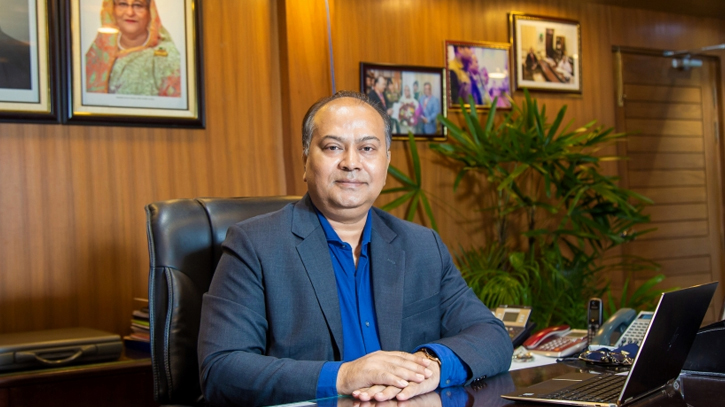
Professor Shibli Rubayat-Ul Islam. Photo: Collected
Professor Shibli Rubayat-Ul Islam, Chairman of the Bangladesh Securities and Exchange Commission (BSEC), said that national development would be driven by capital market bonds.
He emphasised, “National development will come through bonds. This is my primary objective. During the Corona period, I introduced bonds, derivatives, and commodity markets. Once fully implemented, these initiatives will transform the country's economic landscape.”
These remarks were made during a meeting with the Capital Market Journalists Forum (CMJF) on Tuesday. Present at the time were CMJF President Golam Samdani Bhuiyan, General Secretary Abu Ali, former President Ziauddin Rahman, and other executive committee members.
The BSEC chairman highlighted, “Other countries around the world are progressing through bond issuance. We must also move in that direction. Government development projects should be financed through bonds, reducing the tax burden on the people. One of our main goals over the next four years is to advance the country's economy through the capital market.”
He continued, “Development cannot solely rely on loans or taxpayer money. Increasing the tax burden causes frustration among businessmen and the general public. For instance, infrastructure projects like developing the Gulshan market, constructing the Bangabazar market, or creating sewerage canals around Dhaka should be funded through bond issuance.”
Professor Shibli Rubayat mentioned that developed countries like America pursue national development through bonds, adding, “In America, everything is financed through bonds. The country issues trillion-dollar bonds as needed. Unfortunately, our country lacks this knowledge. I have advised Biman Bangladesh to purchase 10 aircraft, and we will approve bonds for them. I have informed them that they need not seek government funding. Instead, they can issue bonds to purchase planes. Foreign investors will buy these bonds, and they can repay the bond money after 8 years. Even if they cannot repay after 8 years, we will approve another bond issuance. This cycle can continue.”
Regarding the ongoing capital market, the BSEC chairman further said that the International Monetary Fund (IMF) advises Bangladesh on various issues annually. One suggestion is to impose taxes on capital gains, which is currently not feasible in Bangladesh. The National Board of Revenue (NBR) has been consulted on this matter and has decided not to impose taxes on capital gains.
“Henceforth, monitoring the initial public offering (IPO) and the secondary market index is not within my purview. The responsibility for overseeing these, along with the capital market, lies with the stock exchanges. I have communicated this decision to the stock exchange authorities,” he added.
The BSEC chairman noted, “An individual cannot be appointed for more than two terms totaling 8 years at BSEC. I have already served two terms, so I do not have the opportunity for a third appointment. Therefore, I have nothing more to lose. My focus now is solely on contributing positively to the stock market.”
He continued, “Over the last four years, I have gained valuable insights into understanding the capital market. I can discern who are allies and who are adversaries. Based on this understanding, I will steer the capital market forward.”
He clarified that monitoring the index fluctuations and bringing companies to the capital market are not BSEC's responsibilities, saying, “However, I have faced criticism for undertaking these tasks to develop the stock market.”
On the same day, the board and senior officials of the country's main capital market, Dhaka Stock Exchange (DSE), and the other capital market, Chittagong Stock Exchange (CSE), extended their greetings to the BSEC chairman.
Additionally, the board of the DSE Brokers Association (DBA) and other capital market-related organisations and companies conveyed their greetings.
Messenger/Disha








